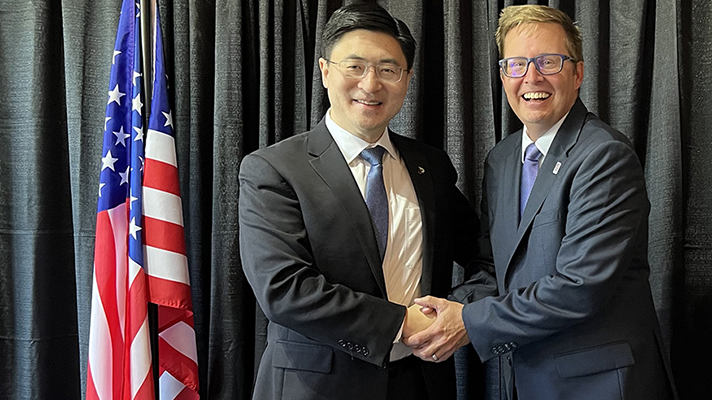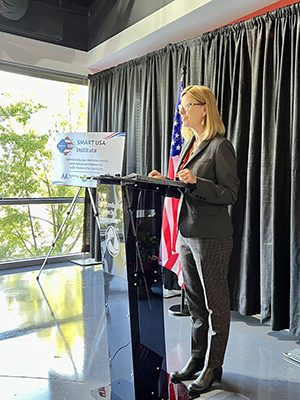Purdue named lead academic institution in $1B national center focused on ‘digital twins’ for semiconductor manufacturing and advanced packaging
Announcement marks Purdue’s latest, largest strategic research win under CHIPS R&D Program

Purdue President Mung Chiang, left, and Todd Younkin, president and CEO of Semiconductor Research Corp., shake hands at the announcement of a new large national institute focused on “digital twins” for semiconductor manufacturing. Purdue is a lead academic institution for the SMART USA Institute. (Photo provided)
Purdue University is a lead academic institution in a large national institute focused on “digital twins” for semiconductor manufacturing and advanced packaging. The U.S. Department of Commerce announced negotiations Tuesday (Nov. 19) to establish the Semiconductor Manufacturing and Advanced Research with Twins (SMART) USA Institute.
SMART USA, a consortium spanning more than 30 states and comprising in excess of 150 expected partners in industry, academia, national labs, and the full spectrum of supply chain design and manufacturing, won the nationwide competition for the manufacturing institute under the CHIPS Manufacturing USA program. The consortium is led by Semiconductor Research Corporation (SRC), which announced the award at its headquarters in Durham, North Carolina.
Purdue University is named the Lead Academic SMART USA Digital Twin Center and also will chair the consortium’s Strategic Governing Council.
Federal research funding for the CHIPS Manufacturing USA Institute totals $285 million over five years. In year one, Purdue’s share will be between $22.5 million and $30 million. Future years will be allocated later. The total funding amount inclusive of partners’ cost-share exceeds $1 billion, making this SMART USA Institute the largest-yet Manufacturing USA Institute since 2014. The award also is Purdue’s largest strategic research win yet under the CHIPS and Science Act after winning multiple national competitions over the past two years.
“Purdue is again selected as the leading university in America in the digital foundation for national, economic and job security of our country. This crucial win will generate transformational research innovations to compound educational initiatives, such as the Semiconductor Degrees Program, and industry partnerships, such as SK hynix’s AI memory chip fab at Purdue Research Park,” Purdue President Mung Chiang said. “We thank the leadership from SRC, the selection by NIST and the outstanding research by Purdue’s faculty leaders, the Office of the Executive Vice President for Research and the strategic pillar of Purdue Computes.”
Purdue and the SRC are longtime partners, already sharing four programs, including the SRC Center for Heterogeneous Integration Research in Packaging, or CHIRP.

Dr. Laurie Locasio, undersecretary of the U.S. Department of Commerce and director of the National Institute of Standards and Technology (NIST), speaks at the SRC headquarters in announcing the SMART USA Institute. (Photo provided)
“We are honored by CHIPS for America’s recognition of SMART USA Institute’s pivotal role in driving semiconductor innovation. This designation as the CHIPS Manufacturing USA Institute reaffirms our dedication to fostering collaboration and excellence across the semiconductor ecosystem,” said Todd Younkin, SRC president and CEO. “At its core, the SMART USA Manufacturing Institute is about bringing people together as a cohesive team. Through this collaboration, we harness the collective strengths and expertise of our partners. Teaming is the cornerstone of our strategy, and it is through this united effort that we will succeed in achieving our ambitious goals.”
Younkin also serves as executive director of the SMART USA consortium.
SRC is a nonprofit American technology research consortium that serves as a platform for collaboration among technology companies, academia, government agencies, and its own engineers and scientists. More than 25 semiconductor companies are members of the SRC, through which they partner with universities and government agencies. SRC and its members invested millions in Purdue and the university’s partners.
The manufacturing institute will focus on the development and use of digital twins for semiconductor manufacturing, advanced packaging, and assembly and test processes. Expectations also include advancing digital twin-enabled curricula and creating hands-on opportunities for training the next generation of the domestic semiconductor workforce.
Digital twins are virtual models that mimic the structure, context and behavior of a physical counterpart. But unlike simulations of physical parts and processes, digital twins provide continuous feedback in a closed loop to adapt and optimize the manufacturing processes as well as the models. They can also exist in the cloud, allowing design and development across the country, which creates new opportunities for participation, speeds innovation, and reduces research and development costs.
Digital twin-based research can utilize artificial intelligence technology to help accelerate design and innovation of new U.S. chip development and manufacturing concepts through cost reduction, product optimization and real-time process adjustments.
Ganesh Subbarayan, director of the Institute for Advanced System Integration and Packaging (ASIP) and Purdue’s James G. Dwyer Professor of Mechanical Engineering, served as the founding executive committee member of this new institute. He said plans for the institute date back to an initial team-forming discussion followed by a workshop at the SRC in July 2021.
“Purdue’s strengths both in computational modeling and fabrication capabilities at the Birck Nanotechnology Center were critical elements that contributed to the successful proposal,” Subbarayan said. “We will serve as the leading academic node of the SMART USA Institute to develop the digital twins and play a leadership role in training of the workforce.” Several Purdue faculty members played important roles in the proposal effort. Purdue is a national academic leader in microelectronics and semiconductors, from world-leading research and industry partnerships to transformational investments in infrastructure and pioneering education and workforce development programs.
Purdue’s growing semiconductor innovation ecosystem is one of the key pillars of Purdue Computes, a comprehensive initiative across computing departments, physical AI, semiconductors, and quantum science and engineering to enable unparalleled excellence at scale.
The CHIPS Manufacturing USA network is operated by the interagency Advanced Manufacturing National Program Office, which is headquartered in the National Institute of Standards and Technology (NIST) in the Department of Commerce.


